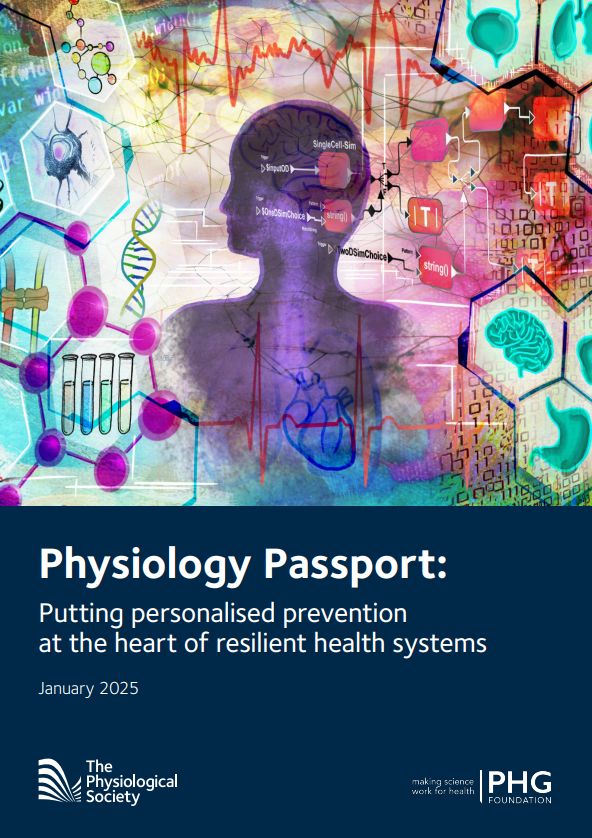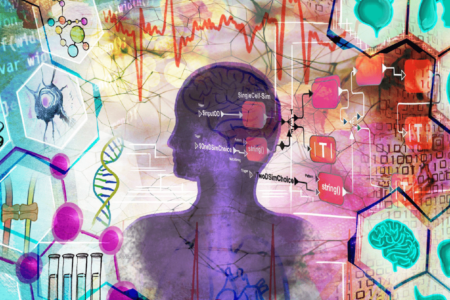Physiology Passport: Putting personalised prevention at the heart of resilient health systems
Our new joint report ‘Physiology Passport: Putting personalised prevention at the heart of resilient health systems’ with the PHG Foundation launched in Parliament on 14 January 2025.

A Personalised Approach to Prevention
Preventative healthcare focuses on diseases through proactive measures, enhancing quality of life and ensuring better long-term health outcomes. Personalised prevention is a key element of preventative health aimed at preventing the onset, progression and recurrence of disease through the adoption of targeted interventions. Various technologies and approaches, underpinned by physiology research, will be integral to the success of personalised prevention. Examples include optimising the use of current tests and technologies, developing new diagnostic and monitoring tests, strategies for monitoring conditions in real time, and the integration and analysis of a variety of health information and data.
‘Physiology Passport’ is a term used, to describe a means to collect, manage and present a person’s physiological health information in their existing electronic health record to establish the parameters that define good health for them as an individual.
As a first step, the passport would optimise the use of current and commonly collected parameters such as blood pressure, weight, cholesterol and blood sugar levels with a focus on more consistent collection of these in a variety of clinical settings. This approach would use tools already approved for clinical use, rather than relying on new technologies, to ensure the quality and standardisation of data. Further, over time data on an individual’s physiological biomarkers could be collected, providing a longitudinal overview of their physiological health and well-being.
Key Recommendations
The report makes a number of recommendations targeting different audiences that will be crucial if we are to fully harness the benefits of the Physiology Passport.
Governments across the UK:
- Support the integration of physiological data into health records: Ensure seamless integration of physiological data into health records to support personalised prevention via the Physiology Passport.
- Focus prevention initiatives on improving health equity: Reduce healthcare disparities and ensure that all populations, including underrepresented and marginalised groups, benefit from advances in personalised prevention.
- Empower and enable individuals: Foster a culture where individuals play a key role in actively managing their health, enhancing health outcomes by bringing care into the community.
- Adopt digital health innovations: Leverage technology for real-time health monitoring, enabling early intervention and reducing the progression of chronic diseases.
- Future-proof adoption of patient-centric technologies through co-creation: Ensure future healthcare technologies are tailored to patient and healthcare system needs and provide data for integration into the Physiology Passport.
Researchers:
- Future-proof adoption of patient-centric technologies through co-creation: Ensure future healthcare technologies are tailored to patient and healthcare system needs and provide data for integration into the Physiology Passport.
- Expand biomarker research: Investigate and discover biomarkers that enhance early detection, monitoring and prevention of a wider range of diseases, providing a scientific foundation and practical framework for the proposed Physiology Passport.
- Develop more comprehensive longitudinal data sets: Create robust predictive models and prevention strategies that reflect changes in health over time and support dynamic prevention strategies.
- Embed patient and public involvement and engagement (PPIE) in research: Ensure that research outcomes are co-developed with, and directly relevant to, the public, particularly those from disadvantaged groups, enhancing trust and engagement with innovations such as the Physiology Passport.
Research Funders:
- Incentivise multimodal translational research: Advance interdisciplinary and multi-stakeholder approaches that combine physiology, genomics, technology and behavioural science for personalised prevention, with the goal of supporting clinical translation.
- Support pilot studies and longitudinal research: Test the feasibility, cost-effectiveness and impact of physiology-led interventions such as the Physiology Passport, and to gather data over time for predictive models.
- Promote health equity in research: Ensure funding is allocated to address health disparities and include under-represented populations in research.
Steering Group Members
We are grateful to the members of the Steering Group who offered their time and expertise to ensure the success of the project.
Professor Dame Melanie Welham, Former Executive Chair, BBSRC (Steering Group Chair)
Dr Chantal Babb de Villiers, PHG Foundation
Dr Laura Blackburn, PHG Foundation
Professor Alastair Burt, University of Newcastle
Professor Colleen Clancy, University of California, Davis
Professor Brendan Cooper, Academy for Healthcare Sciences
Professor Heidi de Wet, University of Oxford
Professor Rob Horne, UCL
Dr Victoria McGilligan, Ulster University
Professor Jonathan Mill, University of Exeter
Professor Catherine Ross, Scottish Government

